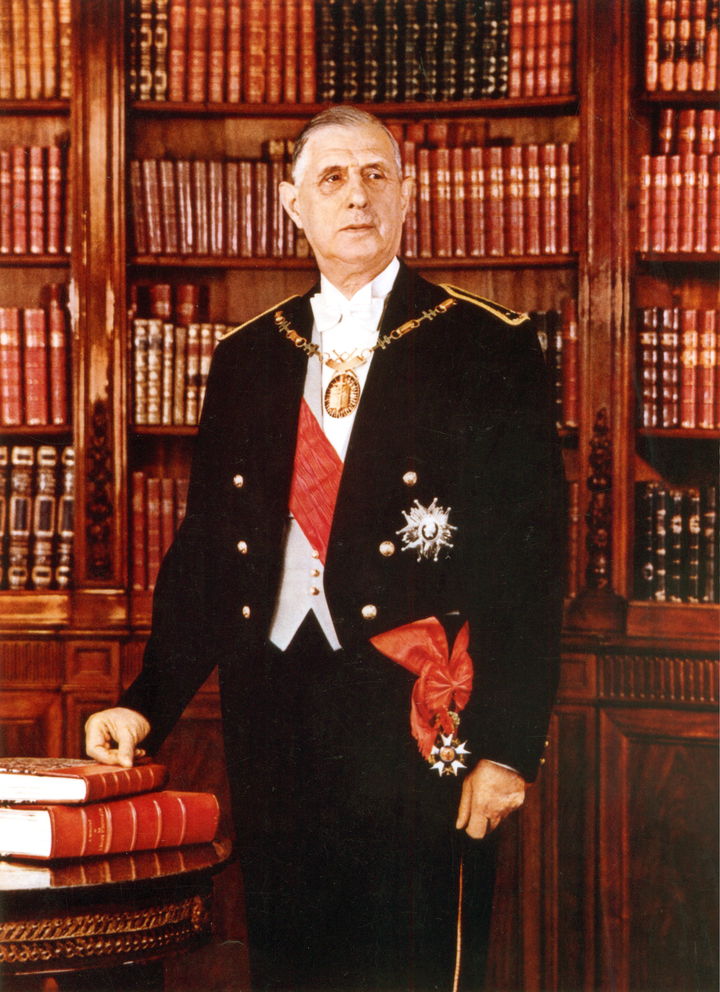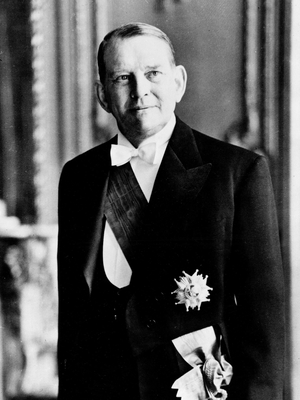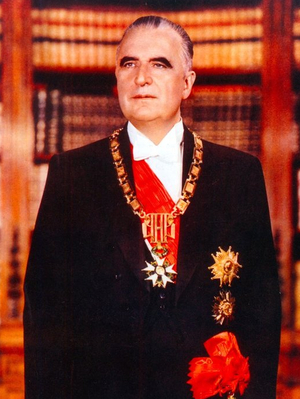
© La Documentation française. Photo Jean-Marie Marcel
22 November 1890
Charles de Gaulle was born in Lille. He was third of five children in a family of Parisian lawyers originally from the Champagne Region.
He did a portion of his primary school studies in the École des Frères of the Christian schools of the Saint-Thomas-d'Aquin parish.
1905
As laws prohibiting religious congregations were passed in France, a young de Gaulle completed his secondary studies with Sacred Heart Jesuits in Belgium.
1908
He was admitted to the St Cyr Military Academy, after one year of preparatory studies at Collège Stanislas.
1912
After leaving the Academy, he joined the 33rd Infantry Regiment based in Arras, under the orders of Colonel Pétain.
1914-1918
Captain de Gaulle was noted for his bravery. After being wounded several times, he was captured by the Germans in March 1916. His attempt to escape landed him in a higher-security facility for the most disobedient officers. These two years in prison left him with bitter memories of feeling useless, even though he kept the boredom of his fellow prisoners at bay by giving them brilliant talks on the course of the military conflict. He attempted escape five times.
April 1919
He was temporarily assigned to the independent Polish Army.
1922
He returned to France and was admitted to the École de Guerre.
He took advantage of the time between the two wars to develop his military theory, publishing La Discorde chez l'ennemi (The Enemy’s House Divided)(1924), Le Fil de l'épée (The Edge of the Sword) (1932), Vers l'armée de métier (Towards a Professional Army) (1934), which promotes the use of tanks, and La France et son armée (1938).
When war broke out, de Gaulle was a colonel in command of the 507th Regiment of Armoured Tanks, in Metz.
25 May 1940
He was appointed general on a temporary basis.
6 June 1940
Paul Reynaud, Prime Minister and Minister of War, named him Under-Secretary of State for National Defence and War, and tasked him with coordinating military action of France and the United Kingdom to continue the fight.
9 June 1940
Charles de Gaulle met with the Prime Minister of the United Kingdom, Winston Churchill.
De Gaulle tried in vain to push the French Government to continue the war, despite the withdrawal of the English Army, which left French territory, re-embarking at Dunkirk.
16 June 1940
Upon his return from England, he learned of the request for an armistice. He left immediately for London to continue the war.
18 June 1940
Broadcast on Radio Londres, BBC’s programme in the French language, General de Gaulle appealed to all officers and soldiers who were on British territory, or who could make it there, to join and continue the fight. This appeal was the founding act of the Free French Forces, led by General de Gaulle.
Although the Appeal of 18 June was not recorded, the Appeal of 22 June was.
27 June 1940
Winston Churchill recognized de Gaulle as the leader of the Free French. With his support, de Gaulle organized armed forces who would become the Free French Forces, and created a French National Committee with the help of René Cassin, who would become the French Committee for National Liberation on 3 June 1943, then the Provisional Government of the French Republic one year later. During these years of war, he progressively rallied the territories of the Empire, created a union with the National Resistance, with Jean Moulin and made France a victorious country, alongside the Allies, the United Kingdom, the United States and the Soviet Union.
14 June 1944
General de Gaulle landed on the beaches of Courseulles-sur-Mer, in Normandy.
25 August 1944
He gave a speech at the Hôtel de Ville of Paris: “Paris! Paris outraged! Paris broken! Paris martyred! But Paris liberated!”
9 September 1944
A Provisional Government, called of national unity, was founded and headed by General de Gaulle.
20 January 1946
De Gaulle, President of the Provisional Government, in disagreement with the Constituent Assembly on the conception of the State, resigned.
16 June 1946
His Bayeux speech laid out a plan for a constitution with a strong executive branch, the beginning of what would become the Constitution of the Fifth Republic.
14 April 1947
He began a movement, the Rassemblement du Peuple Français (RPF), which, despite having done extremely well in municipal elections, did not do as well as expected in the general election of 1951. But the RPF trained and mobilized militants, and created a structure that would prove to be important in 1958.
The Fourth Republic’s inability to handle the Algerian issue made a number of political leaders from all sides desire General de Gaulle’s return.
1954
He published the first volume of his Mémoires de Guerre.
13 May 1958
The Algiers putsch took place.
President René Coty decided to call on the “most renowned Frenchman”.
1 June 1958
Charles de Gaulle became the last President of the Fourth Republic. He was granted full powers and had a new Constitution drawn up.
4 September 1958
General de Gaulle presented the draft Constitution of the Fifth Republic to the people.
28 September 1958
The new Constitution was adopted by referendum, with a majority of 79.2% of votes.
The different French territories also approved it, except for Guinea which would become the first African State to obtain its independence.
21 December 1958
De Gaulle was elected President of the French Republic and the African and Malagasy Community by an electoral college.
The most urgent task concerned Algeria. De Gaulle made many visits to Algeria and made progress towards a solution for independence. After the offer of “peace of the brave” in October 1958, he proposed self-determination to Algerians the following year.
13 February 1960
The first French atomic bomb was detonated in Reganne, in the Algerian desert.
8 January 1961
A referendum on the self-determination of Algerians was held and approved by 75% of French nationals.
22 April 1961
A putsch of the generals failed. Talks with the FLN began.
22 March 1962
The Evian Agreements were signed and approved by referendum in France and Algeria, and Algeria was granted its independence.
Freed of the Algerian War, but not of its aftermath (repatriation of French national, OAS terrorist attacks), the Head of State undertook to conduct a national independence policy, thereby strengthening France’s standing. Refusing the oversight of the United States, de Gaulle slowly withdrew France from NATO’s integrated system (completed in 1966), while remaining a member of the Atlantic Alliance.
22 August 1962
After the terrorist attack of Petit-Clamart, General de Gaulle proposed that Heads of State be elected by universal suffrage, in order to ensure the legitimacy necessary vis-à-vis deputies.
October 1962
The Cuban missile crisis broke out. General de Gaulle was the first to support Kennedy against Khrushchev.
28 October 1962
There was a referendum on constitutional reform, which validated the election of a Head of State by universal suffrage.
22 January 1963
The Élysée Treaty was signed between France and the Federal Republic of Germany. Seeking to build a truly European Europe, de Gaulle refused the entry of the United Kingdom, which was too close to the United States, into the European Economic Community. He strengthened the EEC with the Common Agricultural Policy in 1963.
Conducting a hand-free policy also means strengthen the presence of France in the world vis-à-vis the countries in the former African and Malagasy Community, independent since 1960, but also in Asia and Latin America.
27 January 1964
De Gaulle was one of the first Western Heads of State to recognize and resume diplomatic ties with the People’s Republic of China. He explained the reasons for this in a press conference on 31 January.
1966
During a visit to Cambodia, he gave a speech in Phnom-Penh that criticized American policy in Vietnam.
June 1966
He travelled to the USSR to begin his “détente, entente and cooperation” policy, and to build the “Europe from the Atlantic to the Urals”.
July 1967
“Long Live Free Quebec!” During a visit to Canada, General de Gaulle emphasized his opposition to American imperialism, while defending the historic presence of France in North America.
1965
Universal suffrage was used for the first time. After his first seven-year term-of-office, de Gaulle was elected in the second round of voting, defeating François Mitterrand, with 54.8% of votes.
May 1968
Student and worker protests shook up French society.
30 May 1968
President de Gaulle dissolved the National Assembly, where he held a very low majority. The President won by a strong majority in the general election that followed.
27 April 1969
The referendum on the regionalization and reform of the Senate was rejected by 52.4% of voters. Charles de Gaulle promised to leave power if a majority voted against the referendum. True to his word, he resigned the next day. He was provisionally replaced by Senate President Alain Poher.
He retired to Colombey-les-Deux-Eglises, retired from political life, and dedicated himself to writing his memoirs.
9 November 1970
Charles de Gaulle died.
Only the first volume of his memoirs, Mémoires d'espoir, was completed. While an official ceremony with government officials and foreign dignitaries was held at Notre Dame de Paris, he was buried in the Colombey Cemetery in the presence of his family, Compagnons de la Libération and people from his village.
1958 - 1969 : La présidence de Charles De Gaulle | Archive INA
Inauguration of the presidents of the Republic

also available
Presidents' biographiesUpdated : 14 December 2022

